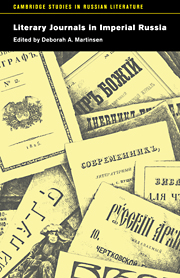Book contents
- Frontmatter
- Contents
- Notes on contributors
- Acknowledgements
- 1 Introduction
- PART I EIGHTEENTH CENTURY
- PART 2 EARLY NINETEENTH CENTURY
- PART 3 MID NINETEENTH CENTURY
- 5 Survey of Russian journals, 1840–1880
- 6 Belinsky the journalist and Russian literature
- 7 The Messenger of Europe
- 8 Dostoevsky's Diary of a Writer, journal of the 1870s
- PART 4 SILVER AGE
- List of titles of journals and almanacs
- Select bibliography
- Index
- CAMBRIDGE STUDIES IN RUSSIAN LITERATURE
5 - Survey of Russian journals, 1840–1880
Published online by Cambridge University Press: 11 March 2010
- Frontmatter
- Contents
- Notes on contributors
- Acknowledgements
- 1 Introduction
- PART I EIGHTEENTH CENTURY
- PART 2 EARLY NINETEENTH CENTURY
- PART 3 MID NINETEENTH CENTURY
- 5 Survey of Russian journals, 1840–1880
- 6 Belinsky the journalist and Russian literature
- 7 The Messenger of Europe
- 8 Dostoevsky's Diary of a Writer, journal of the 1870s
- PART 4 SILVER AGE
- List of titles of journals and almanacs
- Select bibliography
- Index
- CAMBRIDGE STUDIES IN RUSSIAN LITERATURE
Summary
In the mid nineteenth century, literary journals assumed a primary position as an instrument for the propagation of culture in Russia. Other cultural institutions prospered as well – the imperial court, the schools and universities, the many religious bodies, the theaters, conservatories, salons, communes, discussion groups, academies of arts and sciences, communities of urban and peasant artists and performers, among others – but the literary journals were in a class by themselves. They not only chronicled, criticized, and coordinated the other developments, they also printed a body of fiction and criticism that has continued to shape human self awareness both within and outside Russia down to our own time.
The journals provided an initial place of publication for virtually all works in Russia's great novelistic tradition. Some major figures – for example, Tolstoy and Turgenev – benefited for a few years from this cultural resource and then went on to use other ways of publishing their works. A far greater number of Russia's men of letters, however, including Nekrasov and Dostoevsky, devoted much of their lives to editing and publishing journals or to primarily journalistic writing. Tolstoy and Turgenev, of course, as landed gentry, had ample social and economic resources; Dostoevsky and Nekrasov, although legally noblemen, had to rely on literature for their living and for their place in society. Among Dostoevsky's critics, Nabokov and other “literary aristocrats” have treated journalistic works as less aesthetically “pure”; scholars with a broader cultural vision tend to join Joseph Frank in recognizing that the literary greatness of Dostoevsky and many of his generation is inseparable from their journalistic quality.
- Type
- Chapter
- Information
- Literary Journals in Imperial Russia , pp. 91 - 116Publisher: Cambridge University PressPrint publication year: 1998
- 2
- Cited by

